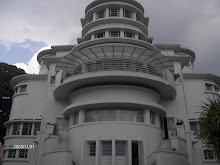Report of the Period of English Literature
By. Nery Eka Pratiwi (054760)
Course: Foundation of Literature (IG105)
The earliest period of English Literature is in the Old English Period or The Britons and the Anglo-Saxons. It is regarded as beginning with the invasions of Britain by Germanic tribes in 5th century AD and lasting until the French invasion under William the Conqueror in 1066. The products of this period are very limited. At the beginning of English literature development, the products comprise anonymous charms, riddles, and poems. And the most popular one is the mythological Beowulf (8th century).
The next period is Middle English Period, was conquered by the French-speaking Normans, a number of texts from various genres have been preserved. This period has much influence to the development of the novel in the eighteenth century due to the development of a new genre, romance. The products of this period are Canterbury Tales (1387) by Geoffrey Chaucer, Piers Plowman (1367-70) by William Langland and le Morte d’Arthur (1470) by Thomas Malory.
The English Renaissance is also called the Early New English Period, a term which focuses on the history of the language, and the Elizabethan Age (Queen Elizabeth I) or Jacobean Age (King James), divisions based on political rule. The outstanding products of this period were written by John Milton (1608-74), whose political pamphlets and religious epics (paradise Lost, 1667 and paradise Regamed, 1671). In literary history the era after the Commonwealth is also referred to as the Restoration or sometimes as Baroque. Also in this period is the new outlook of literary genres such as poetry which influenced by the most outstanding poet, Shakespeare.
The next period is Augustan age which emerged during the 18th century. In this period, classical literature and literary theory were adapted to suit contemporary culture. Authors such as John Dryden (1672-1719) and Jonathan Swift (1667-1745) wrote translations, theoretical essays and literary texts in a variety of genres. This was also a time of influential changes in the distribution of texts, including the development of the novel as a new genre and the introduction of newspapers and literary magazines such as The Tatler (1709-11) and The Spectator (1711-14), Samuel Richardson’s(1689-1761) Pamela (1740-41) and Clarisse (1748-49) marked the beginning of the novel as a new literary genre.
At the end of the 18th century, Romanticism marks the beginning of a new period in traditional English literary history. This period is called the golden period because it is considered to be as the beginning of a new period in which may be seen as reaction to the enlightenment and changes throughout Europe and America at the end of the 18th century. The first edition lyrical ballads (1789) is contained the first significant poetry of Wordsworth and Coleridge. The others important representatives in this period are William Blake, John Ketas, Percy Bysshe Shelley and Mark Shelly.
The Victorian age (second half of 19th century) is as the era which stands nearly beside The Elizabethan period in the significance and interest of its work. the Victorian literature makes a specially strong appeal because it is in part the literature of our own time and its ideas and point of view are in large measure ours. We must begin by glancing briefly at some of the general determining changes and conditions to which reference has just been made, and we may naturally begin with the merely material ones. The outstanding representatives in this period are Charles Dickens (1812-1870), William M Thackeray (1811-1863), Charlotte (1816-1855) and Emily Bronte (1818-1848) and George Eliot (1819-1980).
Then, English Literature development directed to the Modernism era. “Modernism” is a blanket term which encompasses the extensive literary innovations in the first decades of the twentieth century which manifest themselves under the influence of psychoanalysis and other cultural historical phenomena. The representatives are James Joyce’s Ulysses (1992) and Finnegans Wake (1939), Virginia Woolf’s Mrs Dalloway(1925) and to the lighthouse (1927), Gertrude Stein’s Three Lives (1909), Ezra Pound’s the Cantos(1915-1970), T.S. Eliot’s The waste land (1922) and William Faulkner’s The Sound and the Fury (1929).
The latest completed the history of English literary is in Postmodernism era regarding innovative narrative techniques are taken up again and adapted in an academic, sometimes formalistic ways. The works are John Barth’s Lost in Funhouse(1968), Thomas Pynchon’s the Crying of Lot 49 (1966), Raymond Federman’s Double or Nothing (1971) and John Fowles’s The French Lieutenant’s Woman (1969) and the postmodern film adapt many elements from postmodern poetry and fiction to suit their media.
Adapted by An Introduction to Literary Studies book by Mario Klarer


Tidak ada komentar:
Posting Komentar